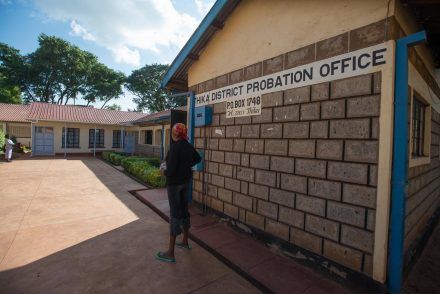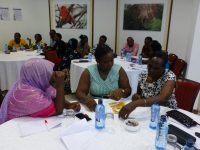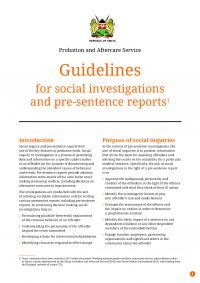Why a gender-sensitive approach is needed: a Probation Director’s perspective
20th July 2017

PRI talked to Paul King’e, County Probation Director in Nakuru, Kenya, to find out how a gender-sensitive approach to community-based programmes can help female offenders in Kenya.
Tell us about your role within the Kenya Probation Service.
I serve as the Nakuru County Probation Director charged with the responsibility of coordinating the implementation and monitoring of all departmental programmes and projects in the county, and compiling reports for onward transmission to the probation headquarters. I am responsible for ensuring effective and speedy administration of justice through generation of social pre-sentence reports for High Courts and Power of Mercy Committees, and subsequently supervision of all cases released. I ensure effective and efficient administration of the County Probation Services.
How were you involved in the efforts to implement a new approach for women offenders?
The probation headquarters team from Nairobi arrived in my county in February 2017 for a sensitisation workshop geared towards conducting gender-sensitive social inquiries, and compiling comprehensive and quality pre-sentence reports that were also gender sensitive. A series of induction clinics were thus conducted in the three sub-counties of Naivasha, Nakuru and Molo. All probation officers in these stations had the opportunity to listen to the presentations and raise questions in areas they did not understand. Eventually, every officer was given a comprehensive document containing guidelines for conducting social investigations and compiling pre-sentence reports. In March 2017, we held a brief meeting with sub-county heads where we strategised on how we could work together as a team within the county. After much deliberation, we came to a consensus to jointly have a follow-up sensitisation workshop where all officers in the county would meet together to exchange their views on improved methods of social inquiries and report writing.
A new approach is necessitated by the fact that prisons formerly were established without having female offenders in mind.

Training for probation officers
In preparation for this follow-up sensitisation workshop, I took the initiative to study and come up with a series of summary documents on various international instruments that I considered to be informative for non-custodial sentences and on better treatment of offenders, especially women. Notable were the Bangkok Rules, Mandela Rules and Tokyo Rules, the Kampala and Arusha declarations, as well as the Riyadh guidelines. I also endeavoured to come up with guidelines to justify the need for gender-sensitive social inquiries and report writing as well as formulating relevant probing questions officers could ask while conducting inquiries. All this was done in a bid to have the officers’ minds tuned to fully embrace the new approach. Eventually, the follow-up workshop was held as scheduled, and presentations were made and subjected to serious discussion. At the end of the day, the officers expressed their satisfaction that the new approach for women was indeed relevant and necessary. All left fully convinced that the idea could work for the benefit of all offenders, including men, who could be widowers and have children to care for.
Why do you think a different approach is needed?
A new approach is necessitated by the fact that prisons formerly were established without having female offenders in mind. This was mainly because the population of women in the crime arena was then insignificant. Today, things have changed as more women are now involved in all types of crime, thus putting them in conflict with the law. This has now taxed the prison authorities to consider catering for the needs of women offenders. For this to happen, comprehensive and gender-sensitive pre-sentence reports are required to inform the various criminal justice agencies on the best treatment methods to apply for both custodial and non-custodial female offenders in the process of their supervision, reintegration and resettlement.
Enormous differences exist between male and female offenders in Kenya. Some of the glaring differences between them are:
- There are more male than female offenders.
- Women offenders may have a history of being physically and sexually abused.
- Women offenders have varying needs that, in most cases, are not met within the criminal justice system.
- Women, more than men, are uneducated and unemployed, thus relegating them to a very poor economic status which leads them to crime.
- While male offenders are excused from going to prison with their children, virtually all women offenders with children are accompanied to prison or to community work by their dependent children.
- Society tends to look down upon women offenders more than men, meaning that women are more stigmatised than their male counterparts.
- Whereas male offenders are likely to be frequently visited by relatives including their wives, this is not the case with female offenders.
How do you think the Bangkok Rules are a helpful instrument for your work, and the work of all stakeholders involved in the management of women offenders?
The Bangkok Rules were an eye-opener that helped highlight the plight of women offenders.They helped create an awareness that women offenders actually needed a kind of special attention and treatment for them to reform within prison as well as while serving non-custodial sentences. I fully concur with the views that these rules are indeed a helpful instrument to probation work in Kenya in regard to women offenders, because:
- The rules specifically address issues that are relevant to the treatment of women offenders.
- They provide guidance to all stakeholders, inclusive of legislators, prison and sentencing authorities, as well as probation officers dealing with women offenders and making provision of their specific needs.
- They are intended to enhance the use of non-custodial sentences for all women and youthful offenders and, in addition, arouse interest among stakeholders involved in the management of this special category of offenders.
Have the Bangkok Rules and a gender-sensitive approach been accepted by the probation officers and other stakeholders you work with?

Amended guidelines for pre-sentence reports.
With the recent sensitisation workshop conducted in my county, I can say with confidence that the officers indeed appreciated and wholly embraced this new approach which they accepted to be the right way to go. The judicial officers, some of whom were initially briefly sensitised, also accepted that they had seen marked improvement in the new manner of report writing by probation officers. However, it is vital to note that prior to the launching of this new approach, probation officers had not been very keen on gender responsiveness. Taking into account that this new approach has been piloted only in Nakuru and Kisumu counties, I believe that many probation officers and stakeholders are yet to be brought on board in a bid to apply it in all the remaining 45 counties in Kenya. My prediction, based on my brief experience gained, is that the officers in these other counties will too accept the approach once effective sensitisation takes place.
What do you see as the main challenges for women serving community sanctions in Kenya? How do you seek to help women overcome these?
The main challenges of women offenders under community-based programmes in Kenya include:
- Difficulties in balancing their time when rendering community service with performing casual jobs that earn them their daily bread.
- The agencies’ supervisors fail to be flexible in order to allow the offender to carry out community service after performing their paid job.
- There are instances where women offenders have raised concerns of being harassed by agency supervisors, with some even attempting to make sexual advances towards them.
- Women with small children also encounter formidable challenges when compelled to render community service, while at the same time being required to give undivided attention to their babies. Being poverty-stricken, such women lack the ability to hire house help to nurse their children while they perform community service.
- The courts, as the sentencing authorities, also sometimes fail to be gender sensitive, thus disadvantaging the women who are treated equally as men, yet who have varying needs which are specific to them.
The efforts that have been made to help women offenders overcome these challenges are:
- Adopting a gender-sensitive approach right from the initial stage of conducting social investigations and report writing, and supervision in order to highlight and address challenges female offenders go through and identify specific needs they may require for effective treatment.
- Giving specific treatment to each case handled to ensure that each female offender get the most suitable treatment and attention she deserves.
- Critically examining the case of each woman offender to establish whether they are pregnant or have children who wholly depend on her, and also to understand what factor led to her involvement in crime. Such considerations help to determine the best treatment programmes or intervention for their rehabilitation.
What do you think is needed to improve gender-sensitive approaches to community service and probation for women?
- A series of sensitisation workshops for probation officers, sentencing authorities and other stakeholders – who may include the police and community service supervisors – on a gender-sensitive approach.
- Incorporate gender issues in policies and community programmes, taking into account that women stand on a more disadvantaged ground than men in any given situation.
- Develop strategies that will improve women’s access to justice and fair treatment, with due consideration of their physical, psychological, economic and social challenges.
- Increase women’s ability to establish their own income-generating enterprises so that they may engage in gainful and lawful means of earning a living, hence enabling them to have ways of supporting themselves and their family without being in constant conflict with the law.
- Identify community-based organisations that are likely to understand the plight of women offenders and thus commit themselves to assist them to successfully manage to re-enter the community without stigmatisation or encountering other related difficulties/challenges.
More Information:
Click here to view further resources for implementing a gender-sensitive approach to non-custodial sentences, including guidelines for incorporating a gender-sensitive approach to social enquiries and pre-sentencing reports.
Main image: Probation Office in Kiambu County, Kenya, © Allan Gichigi 2014.